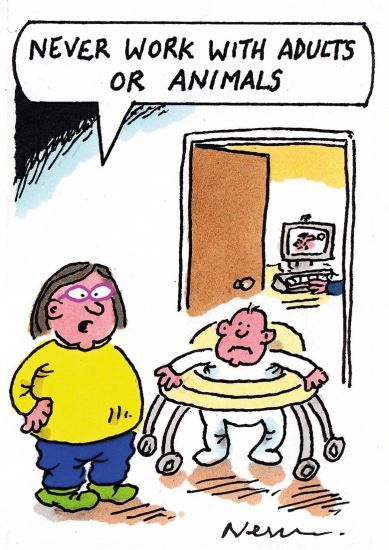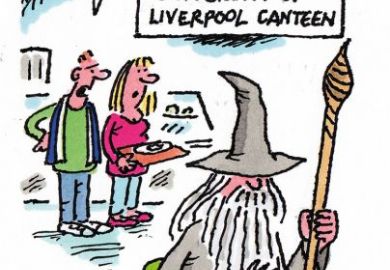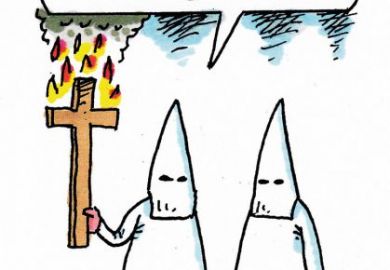
He is a global icon of uber-intelligence, but it appears that Stephen Hawking is no fan of the notion of “IQ”. In an interview with Good Morning Britain host Piers Morgan, the 75-year-old cosmologist joked that people who boast about their IQ are “losers”, the Daily Mail reported on 20 March. His jibe was widely seen as an attack on Donald Trump, the US president, who has claimed that his IQ is “one of the highest” – an unverified assertion that is often used by his supporters as evidence of his competency for high office. Professor Hawking did not get around to giving his views on another of Mr Trump’s equally unscientific claims about his intelligence: that his “genius” university professor uncle John somehow provides proof of the tremendous acuity of Mr Trump’s own grey matter thanks to his “very good genes”.
A US academic whose toddler and baby crashed his interview with the BBC has described how a “minor mistake…made my family into YouTube stars”, The Sun reported on 14 March. Robert Kelly, professor of political science at Pusan National University, told the BBC how he feared that his interview on 10 March was a “disaster” after his four-year-old daughter Marion burst into his study, followed shortly by his nine-month-old baby James in a walker, before Professor Kelly’s wife skidded into the room to remove the children with almost superhuman efficiency. At the conclusion of the interview, the “mortified” Asia politics expert thought that he would not be wanted back by the network, but the “BBC Dad” clip has since become an internet sensation, described by Daily Show host Trevor Noah as the “greatest moment in television history”. Indeed, the hilarious incident has gained far more attention worldwide than South Korea’s political crisis, which has been largely forgotten as the Kellys’ fame went stratospheric.
A brilliant debate on higher education in the UK’s House of Lords was brought down to earth when one peer rolled out some of the hoariest clichés about campus censorship. Directly after the Lords voted on 13 March for a U-turn on the government’s policy of including international students in migration statistics, Baroness Deech stood up to denounce the “farcical gagging of speech” at many universities. Unlike the robust evidence cited in the debate, that advanced by the former principal of St Anne’s College, Oxford came from a less scientific source – the Free Speech University Rankings compiled by online magazine Spiked. Lady Deech recalled indignantly “the LSE lecturer who was silenced when his views about welfare were found to be likely to be unacceptable”. One problem with this explosive point was that the scholar in question, Adam Perkins, doesn’t work at the London School of Economics as he is a lecturer at King’s College London. The other is that the LSE generously organised a public talk in June 2016 for Dr Perkins, whose theories and methods were comprehensively demolished in the debate that followed. Lady Deech’s apology to the LSE is presumably in the post.
The PhD thesis of a senior adviser to Donald Trump has come under scrutiny after critics claimed that it revealed his membership of a Hungarian far-right group with links to the Nazis. Sebastian Gorka, the top counterterrorism adviser to the US president, has denied that he is a member of the Vitézi Rend, which collaborated with Hitler to deport Jews into Nazi hands. But on 16 March, the online news site Forward highlighted how Dr Gorka used the name “Sebastian L. v. Gorka” for his 2008 doctoral dissertation from Hungary’s Corvinus University of Budapest, and noted that the “v” initial is often used by members of the Vitézi Rend. Failure to list any affiliation with the group could undermine Dr Gorka’s claim to the US citizenship that he obtained in 2012, experts have warned. No doubt Mr Trump’s new “extreme vetting” – currently directed at immigrants deemed likely to pose a risk to the US – will get to the bottom of the controversy.
Staff at the University of Glasgow have called on students to vote “wisely” in the elections for their rector after candidate Milo Yiannopoulos said that he wanted to ban the Muslim society to protect gay students. In a statement published on 15 March, Glasgow’s University and College Union branch warned that the “expressed views” of some candidates would make it “difficult for them to properly represent the interests of the full diversity of the university’s students, which is the rector’s main role”. The British-born journalist says that he is keen to take the role in Glasgow, which he describes as a “great town despite its garrulous dranks [sic] and drab, spiky-haired lesbian ‘comedians’”. Some 3,500 students have signed a petition condemning his candidacy.
Register to continue
Why register?
- Registration is free and only takes a moment
- Once registered, you can read 3 articles a month
- Sign up for our newsletter
Subscribe
Or subscribe for unlimited access to:
- Unlimited access to news, views, insights & reviews
- Digital editions
- Digital access to THE’s university and college rankings analysis
Already registered or a current subscriber?




